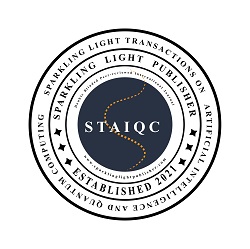Open Access
Subscription
No publication fee is charged to authors, and published articles are immediately available to everyone through open access model.
Sparkling light Transactions on Artificial Intelligence and Quantum Computing (STAIQC)
e-ISSN: 2583-0732
Published by: Sparkling Light Publisher
STAIQC is a double-blind peer-reviewed, international journal dedicated to publishing pioneering research in Artificial Intelligence (AI) and Quantum Computing. The journal provides a scholarly platform for academics, researchers, and industry experts to present original research, reviews, and innovative findings that foster progress at the intersection of intelligent systems and quantum technologies.
STAIQC welcomes submissions in, but not limited to, the following areas:
Artificial Intelligence:
Machine Learning and Deep Learning
Natural Language Processing
Computer Vision and Pattern Recognition
Explainable AI and AI Ethics
Reinforcement Learning and Intelligent Agents
Cognitive Computing and Robotics
Quantum Computing:
Quantum Algorithms and Simulation
Quantum Machine Learning
Quantum Cryptography and Secure Communication
Quantum Software and Programming Languages
Quantum Hardware Architectures
Hybrid AI-Quantum Systems
Interdisciplinary Applications:
AI-enhanced Quantum Control and Optimization
Quantum Data Science and Quantum Neural Networks
Real-world applications in Healthcare, Finance, Physics, and Cybersecurity
Research Articles: Original research with significant technical content (20–30 pages, max 50).
Review Papers: Comprehensive surveys of current trends and developments.
Short Communications: Brief reports on novel ideas or emerging results.
Case Studies and Application Reports: Practical implementation and evaluation of AI/Quantum systems.
Letter Articles and Commentaries: Discussions on published work or relevant issues.
Software Articles: Open-source AI or quantum tools with reproducible research value.
Interactive elements like animations, video demonstrations, and software links are encouraged.
File Format: .doc/.docx or .tex (PDFs only for review).
Title Page: Include title, author names, affiliations, ORCID IDs, and corresponding author details.
Abstract: Max 250 words; avoid citations and uncommon abbreviations.
Keywords: 4–7 keywords.
Highlights: 3–5 bullet points summarizing the paper’s novelty or impact.
Graphical Abstract (Optional): Minimum resolution: 531x1328 pixels.
Figures: JPG, PNG, TIFF, EPS, or PDF; 300 dpi minimum.
Tables: Editable text format, not images.
Equations: Submit as editable text, not images.
AI-generated visuals must be clearly indicated if part of the methodology; otherwise, are not permitted.
STAIQC follows a double-blind peer review process. Each manuscript is reviewed by at least two independent experts. Final decisions are made by the editors.
Editors do not handle submissions where conflicts of interest exist. Independent reviewers are assigned in such cases.
Authors must follow ethical guidelines aligned with COPE and Sparkling Light Publisher’s standards. No plagiarism, data fabrication, or unethical conduct will be tolerated.
Each author must have significantly contributed to:
Research design, execution, or analysis.
Drafting or revising the manuscript.
Approving the final version.
The corresponding author is responsible for all communication.
Must be requested before acceptance and require written consent from all authors.
All financial, institutional, or personal conflicts must be disclosed. If none, state:
“The authors declare no competing interests.”
Disclose any funding received or state:
“This research received no specific grant from public, commercial, or non-profit funding agencies.”
If AI tools (e.g., ChatGPT, Grammarly) were used for language editing, disclose in the following format:
“The authors used [tool name] to improve language clarity. The authors reviewed the content for accuracy and accept responsibility for the final manuscript.”
Authors may include:
Datasets, video files (max 150 MB/file), code repositories, and figures.
Research data should be deposited in recognized repositories and cited properly.
Example:
“The data supporting the findings of this study are available at [repository link] under [license].”
Inclusive and gender-neutral terms must be used. Where applicable, authors should distinguish between sex and gender and include Sex and Gender-Based Analyses (SGBA) per the SAGER guidelines.
Use square brackets: e.g., [2, 5] or Smith et al. [3].
DOIs are encouraged for all references.
Follow LTWA for journal abbreviations.
Examples:
Journal Article:[1] A. Kumar, Quantum AI integration, Quantum Sci. Rev. 12 (2023) 113–129. https://doi.org/10.xxxx/qsr.2023.04567.
Book:[2] L. Nielsen, Quantum Computing: A Beginner’s Guide, Springer, Berlin, 2021.
Authors will be notified throughout the editorial stages via email.
Authors may choose:
Subscription-based publication (free for authors).
Gold Open Access with optional licensing upon acceptance.
A publishing agreement will be signed post-acceptance.
Authors must return corrected proofs within 2 days.
A 50-day free-access share link will be provided post-publication.
Authors are encouraged to promote their work via conferences, academic networks, and social platforms.
For submission queries, appeals, or general inquiries, contact:
staiqc@sparklinglightpublisher.com
No publication fee is charged to authors, and published articles are immediately available to everyone through open access model.

The published works in Journals, except for the website's content, are licensed under a Creative Commons Attribution-Non-Commercial 4.0 International License.
STAIQC is undertaken by Sparkling Light Publisher.